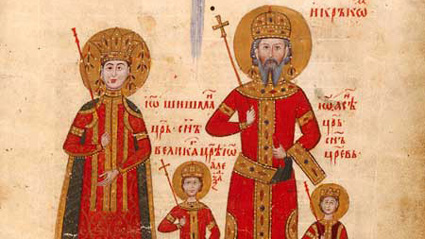
Ivan Alexander is the ruler of Bulgaria from 1331 to 1371. Those 40 years make him the second longest-serving ruler after Tsar Peter, who was on the throne from 927 to 969. One should keep in mind that in that time the entire Balkan region was experiencing tremendous turmoil. Bulgaria was threatened by its neighbors, some Western conquerors, as well as a new enemy - the Ottomans. The rule of Ivan Alexander is marked by a number of conflicts but he managed to preserve Bulgaria as a primary force in the region.
The ruler is the nephew of King Michail Shishman and relative of the Asen dynasty. He began his career as a despot of Lovech city and its region. After the coup against Tsar Ivan Stephan, Alexander gradually won the trust of Turnovo and was elected as the new king. Chroniclers also reveal that Ivan Alexander was a very educated man, speaking fluent Greek.
His qualities helped him during the first 15 years in power, when he fought numerous battles with Byzantium for lands in southern Bulgaria. He even became part of the dynastic struggles of Byzantium and was able to gain time by negotiation and when necessary, through decisive attack. In 1332 he won an important battle at Rusokastro, which returned to Bulgaria the lands of today’s southern Black Sea coast. He later won Plovdiv and a number of fortresses in the Rhodope Mountains, contributing to establishing the Bulgarian character of these lands.
Historians of the nineteenth and the twentieth century accuse Ivan Alexander that in 1351 he refused to form a coalition with the Byzantine Emperor John Cantacuzene against the Ottomans. This circumstance was considered decisive in the development of Bulgarian history. But the picture of the XIV century is not so simple. The hazard of the Ottomans was underestimated in Europe and the Byzantines themselves often used their mercenaries in dynastic wars and against the Bulgarians. In fact the Ottomans conquered a region torn by feudal struggles.
In the field of culture the ruling of Ivan Alexander is often called Second Golden Age /The first was during the reign of Simeon the Great - 893-927/. In this new Golden Age for Bulgaria a number of churches and monasteries were built. Those that survived during the Ottoman invasion, such as the rock church "St. Mary" with magnificent frescoes near the village of Ivanovo, Rousse, are now monuments of culture. Among the manuscripts of that era The Gospels of Tsar Ivan Alexander stands out. The magnificently-decorated manuscript is today kept in the British Library.
From his marriage with Theodora, daughter of a Wallachian voivode, the king had three sons. After long hesitation he proclaimed the second of them - Ivan Sratsimir for heir. In 1349 Ivan Alexander married the young Jew Sarah, who converted to Christianity and took the name Theodora II. She really was a zealous Christian and encouraged the king in his struggle with heresy. Ultimately Shishman - the first son of the second royal marriage was proclaimed heir to the throne. Ivan Sratsimir received northwestern Bulgaria, which turned into the Vidin kingdom. This is was not the only case of feudal fragmentation.
A new feudal state was also formed by Despot of Dobruja, Dobrotitsa. Ivan Alexander was a stabilizing factor, and while he was alive, all those lands were considered Bulgarian.
Ivan Alexander is Bulgaria’s last great ruler and he showed extraordinary qualities in difficult times of continuous conflicts and feudal fragmentation. For 40 years Tsar Ivan Alexander managed to preserve stability in Bulgaria but shortly after his time the country was conquered by the Ottomans. The Bulgarians were already a strong nation with deeply rooted traditions and managed to preserve their identity during the dark years of Ottoman domination.
English version: Alexander Markov
On November 25, the Bulgarian Orthodox Church honours the memory of St. Clement of Ohrid – a distinguished archbishop, teacher and scholar. He was among the most prominent disciples of the brothers Cyril and Methodius, the Holy Seven Apostles – the..
On November 24, the Bulgarian Orthodox Church honors St. Catherine (Sveta Ekaterina in Bulgarian) , who was one of the most educated women of her time. She lived in the late 3rd and early 4th centuries and came from a noble family in Alexandria...
The Patriarchal Cathedral of St Alexander Nevsky is celebrating its temple feast today. The cathedral, a symbol of the Bulgarian capital, was built "in gratitude to the Russian people for the liberation of Bulgaria from Ottoman rule in 1878". Who..
The fighting for Sofia within the framework of the Russo-Turkish War (1877-1878) began on December 25, 1877. On January 3, 1878, the city's commandant..

+359 2 9336 661
